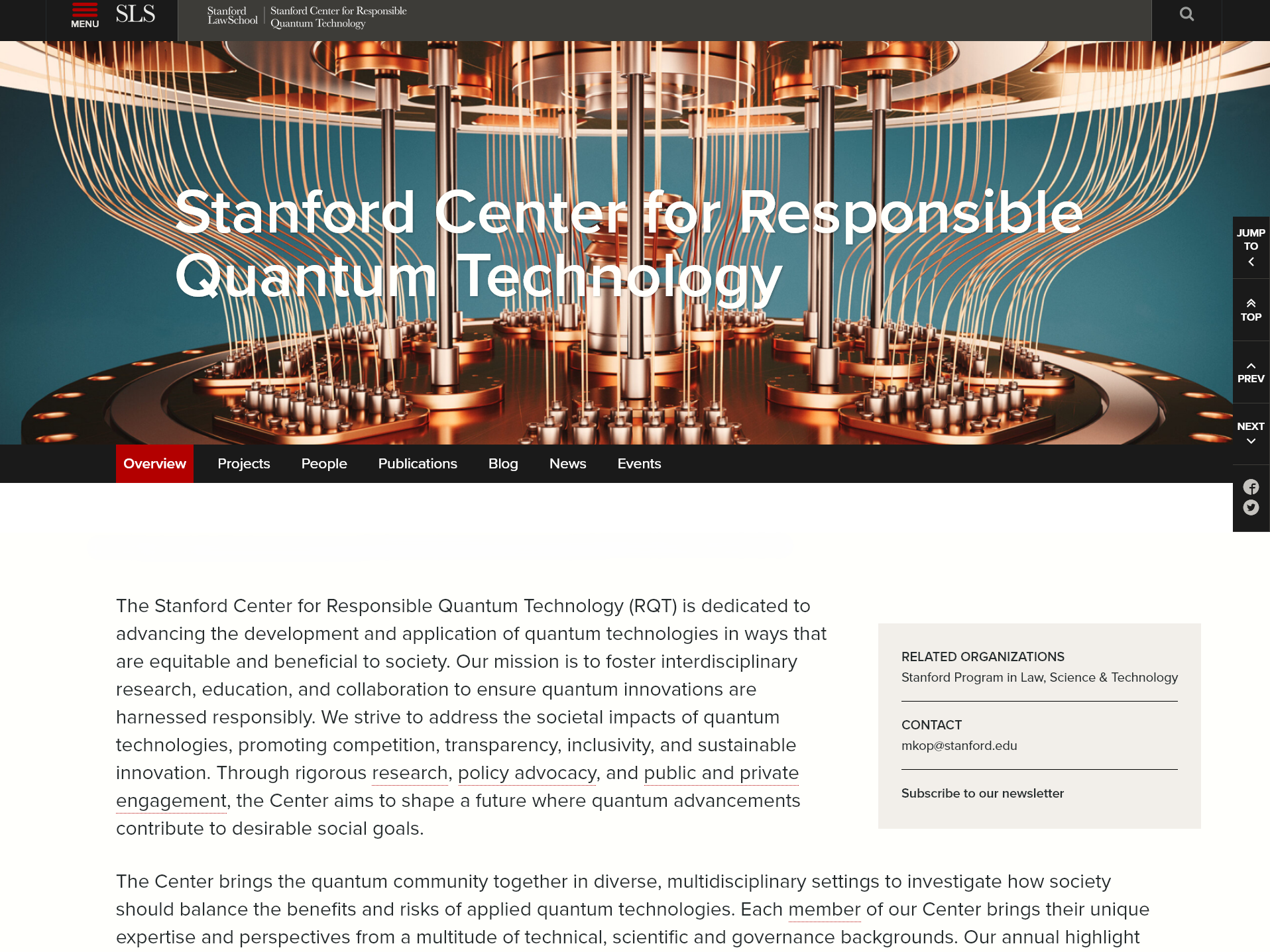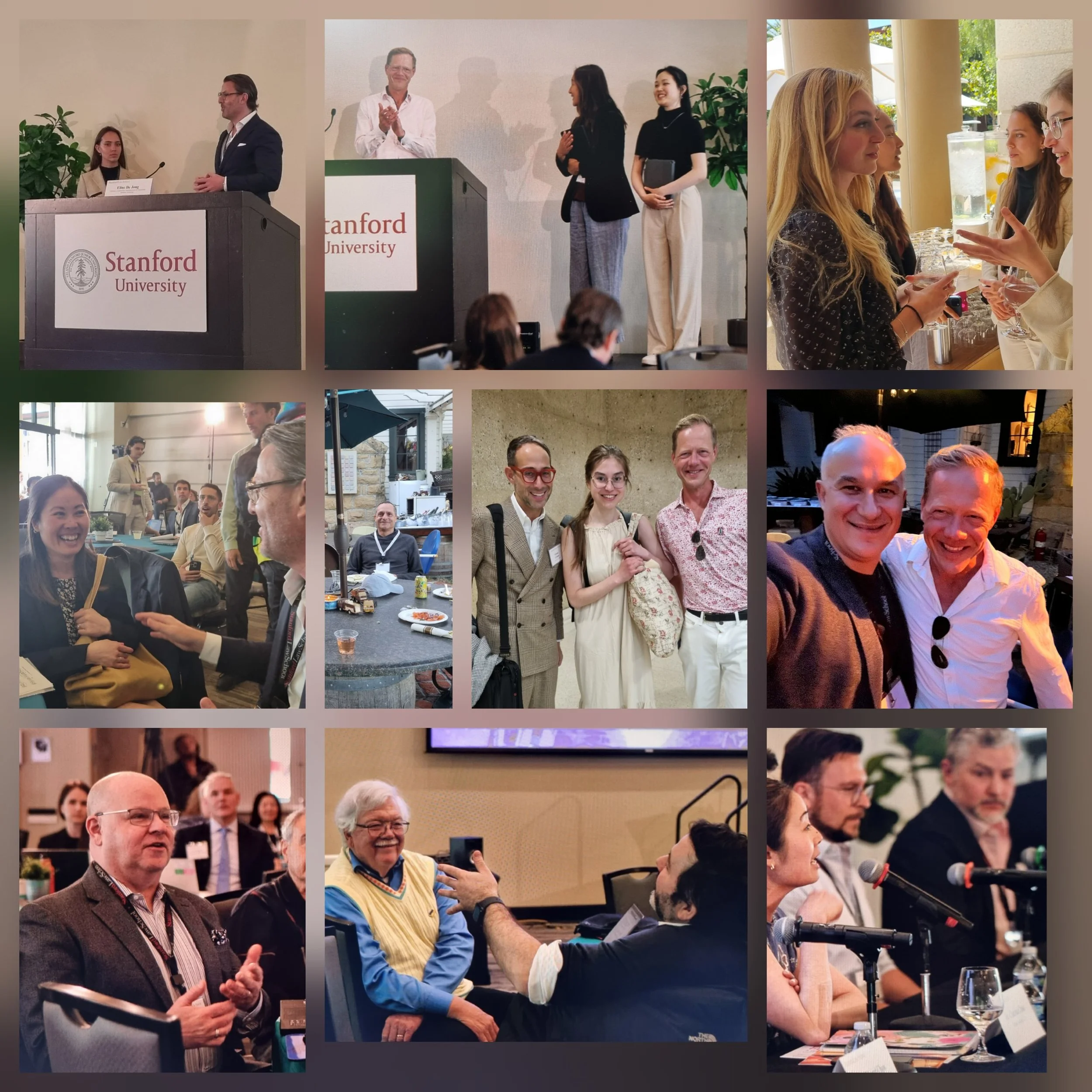Stanford University Library Creates Permanent RQT Scholarship Repository Of Selected Works
Stanford, CA, July 10, 2025 – Stanford University Library, in a significant move to advance the field of responsible quantum innovation, has established a dedicated digital scholarship repository for the Stanford Center for Responsible Quantum Technology (RQT), that had its Law School tenure from December 2023 to January 2025. This new collection, accessible via the persistent URL https://purl.stanford.edu/hp536nb5631, will preserve and showcase the influential research and scholarly output of the Center, ensuring its global accessibility for researchers, policymakers, and industry leaders.
The Stanford Center for RQT, founded by Mauritz Kop and part of the Stanford Program in Law, Science & Technology led by Mark Lemley, stands at the forefront of shaping a future where quantum advancements contribute to equitable and beneficial social goals. With a mission to foster interdisciplinary research, education, and collaboration, the Center addresses the profound societal impacts of quantum technologies, promoting competition, transparency, inclusivity, intergenerational equity, and sustainable innovation, all while safeguarding human rights and democratic values. A highlight of the Center's public engagement is its annual Stanford Responsible Quantum Technology Conference, which brings together global leaders to discuss the field's most pressing issues. The creation of this repository marks a milestone in the Center's efforts to disseminate its foundational works, and ensures their longevity.
Stanford University Library Creates Permanent RQT Scholarship Repository Of Selected Works
The Stanford Library Permanent RQT Repository
The initial collection features a selection of the Center's influential publications that underscore its commitment to a holistic and forward-thinking governance approach. The showcased works include:
10 Principles for Responsible Quantum Innovation: Published in IOP Quantum Science and Technology, this seminal paper by Mauritz Kop and his team outlines a guiding framework for the ethical development of quantum technologies, emphasizing principles from safeguarding and accountability to advancing societal well-being.
Towards Responsible Quantum Technology: This foundational paper from the Harvard Berkman Klein Center for Internet & Society Research Publication Series, authored by Mauritz Kop, Mateo Aboy, Eline De Jong, Urs Gasser, Timo Minssen, I. Glenn Cohen, Mark Brongersma, Teresa Quintel, Luciano Floridi & Ray Laflamme, lays out a comprehensive vision for the responsible development and stewardship of the quantum ecosystem.
Mapping the Patent Landscape for Quantum Technologies: This article in the International Review of Intellectual Property and Competition Law published by the Max Planck Institute, authored by Mateo Aboy, Timo Minssen, & Mauritz Kop provides a comprehensive analysis of the patent landscape in quantum technologies, offering evidence-based insights for innovation policy.
Abundance & Equality: In this chapter from the book Scarcity, Regulation, and the Abundance Society (edited by Mark A. Lemley), Mauritz Kop explores how transformative technologies could move society beyond traditional notions of scarcity and what this shift means for regulation, law, the post-scarcity economy, capitalism, moral values, and social equity.
The Quantum Governance Stack: Models of Governance for Quantum Information Technologies: Authored by Elija Perrier in the Springer Nature Topical Collection titled Quantum ELSPI, edited by Mauritz Kop, this work introduces a multi-layered governance model, providing a systematic framework for understanding and developing regulatory approaches for quantum information technologies.
A Brief Quantum Medicine Policy Guide: Published by the Petrie-Flom Center at Harvard Law School, this guide by Mauritz Kop, Suzan Slijpen, Katie Liu, Jin-Hee Lee, Constanze Albrecht & I. Glenn Cohen offers policymakers a concise overview of how quantum technologies may be integrated into healthcare and what regulators should consider.
Regulating Transformative Technology in The Quantum Age: In this piece, Mauritz Kop explores the intersection of intellectual property, standardization, and sustainable innovation, arguing for a balanced approach to regulating quantum and other transformative technologies.
Establishing a Legal-Ethical Framework for Quantum Technology: Published in the Yale Journal of Law & Technology Record, this article by Mauritz Kop lays the groundwork for a comprehensive legal and ethical framework to guide the development and deployment of quantum technologies.
Quantum Computing and Intellectual Property Law: This piece from the Berkeley Technology Law Journal by Mauritz Kop delves into the complex relationship between quantum computing advancements and existing intellectual property law, identifying key challenges and potential solutions.
Quantum ELSPI: A Novel Field of Research: In this editorial article for Digital Society, Mauritz Kop defines and establishes "Quantum ELSPI" (Ethical, Legal, Societal, and Policy Implications) as a crucial and distinct field of interdisciplinary research.
2nd Annual Stanford Responsible Quantum Technology Conference: Summary of Core Themes and Selected Highlights: This RQT Blog post by Constanze Albrecht captures the key discussions and takeaways from the Center's flagship annual event, providing a timely summary of the state of responsible quantum innovation anno 2024.
The Stanford Center for Responsible Quantum Technology during its tenure at the Law School 2023-2025.
A Project-Based Approach to Responsible Quantum Innovation
In addition to its publications, the Center's work is driven by a project-based approach that tackles critical challenges at the intersection of quantum technology and society. Key projects include:
Regulating Quantum Technology: This foundational project performs a detailed study of how to sensibly regulate second-generation (2G) quantum technology. It aims to design sui generis governance frameworks that offer strategic blueprints for decision-makers, integrating risk management, resource optimization, and safety standards to ensure that the benefits of quantum are distributed equitably.
Quantum Leap: Decoding Quantum Computing Innovation: In collaboration with the University of Cambridge, this empirical project by Mateo Aboy conducts a comprehensive analysis of the patent landscape in quantum computing. By examining patenting trends, the project provides valuable, evidence-based insights to inform policy decisions related to intellectual property, innovation, and regulation in this rapidly evolving field.
Equipping Society for Responsible Quantum Innovation: This project by Eline De Jong develops crucial perspectives on how society can anticipate and deliberately shape the trajectory of quantum technologies. Through philosophical and ethical analyses, it explores the societal implications of quantum computing, with a particular focus on cybersecurity and the transition to quantum-safe cryptography, providing a conceptual toolkit for pursuing responsive quantum innovation.
Building Global Capacity for Responsible Quantum Technologies: This fellowship project by Urs Gasser and Constanze Albrecht seeks to contribute to collaborative efforts that transcend geographical and economic boundaries, paving the way for a more equitable future. The project aims to unlock the benefits of quantum-enabled technologies for all people, particularly in World Majority Countries, by addressing challenges of access, affordability, and the global skills gap through multi-stakeholder engagement and capacity-building initiatives.
Quantum Criticality Index (QCI): This project by Min-Ha Lee develops and applies a data-based analytic methodology to discover and mitigate vulnerabilities in the supply chains for Critical Raw Materials (CRMs) essential for quantum technologies. Using machine learning and artificial neural networks, the QCI provides a dynamic tool for industry and policymakers to anticipate and address economic and national security risks.
Q-HCI: Quantum Human-Computer Interaction: This forward-looking project by Jin-Hee Lee advances the emergence of a new field dedicated to the interaction between humans and quantum systems. It explores how the novel capabilities of quantum computing will necessitate a new class of interfaces and why this requires a dedicated shift in HCI research to keep the technology aligned with human values and intuition.
Responsible Quantum AI in Healthcare – Neurotechnology and Beyond: Focusing on a high-impact application, this project by Katie Liu investigates the integration of Quantum AI (QAI) into neurotechnology and cognitive healthcare. It explores frameworks and use cases that prioritize ethical, inclusive, and safe applications of QAI for mental health diagnostics, personalized treatment, and neurodegenerative disease management, leveraging the Center's core principles to guide development.
Quantum Impact Assessment: This project focuses on developing practical tools and methods, known as Quantum Impact Assessments (QIAs), to explore, anticipate, and assess the societal impacts of quantum technologies. QIAs are designed to facilitate responsible adoption by helping stakeholders understand and navigate the opportunities and risks, serving as a moral guide to operationalize responsible quantum principles and ensure that the development of this powerful technology is aligned with societal values.
Stanford Quantum Incubator (SQI): This project stands as a pivotal business catalyst dedicated to advancing quantum technology development and adoption. SQI bridges the crucial gap between academia and industry, galvanizing startups and university spin-offs in the quantum/AI space and fostering a values-based quantum ecosystem in collaboration with the investment community and other key stakeholders.
The Stanford Center for RQT led by Mauritz Kop (Founding Executive Director) and Mark Lemley (Faculty Director).
Key Stanford Center for RQT Focus Areas
The Center's research and policy advocacy are concentrated on several key areas critical to the future of quantum technology:
Global Governance and Standards: Studying how technical standards, certification, and other governance mechanisms can foster the trust needed for technology uptake and responsible deployment. This includes exploring governance tipping points, geopolitics, smart regulation, dual-use, supply chains, and export controls, all within a framework that advances first-to-market innovation, reinforces human rights and safeguards democratic values.
Quantum Diplomacy and Government Advocacy: Informing policymakers, diplomats, and the judiciary about the principles of responsible quantum technology, and fostering international dialogue and strategic alliances to shape effective global governance strategies.
Intellectual Property, Fair Competition and National Security: Investigating the role of IP rights like patents, trade secrets, and antitrust law in fostering a competitive and innovative quantum ecosystem, and their interface with economic safety and national security.
Societal Benefit and the UN SDGs: Prioritizing investments in quantum applications that support the United Nations Sustainable Development Goals (SDGs), focusing on areas like healthcare, climate modeling, and sustainable energy.
Building a Quantum-Ready Workforce: Cultivating quantum awareness, literacy and intuition, and actively building a skilled, interdisciplinary, and diverse quantum workforce.
Building a Leading, Values-based Quantum-AI Ecosystem: Fostering a collaborative environment that bridges academia, industry, and government to accelerate the development and adoption of responsible quantum and AI technologies.
Art-inspired Scientific Discovery: Exploring how artistic paradigms and creative, lateral thinking can open new pathways for innovation and understanding in quantum science.
Learning from other Emerging Technologies: Drawing lessons from the governance of AI, nuclear fission and fusion, biosciences, nanotechnology, VR, and the internet to inform a proactive approach to quantum governance.
The Convergence of Quantum and AI: Exploring the cross-pollination of quantum and AI (QAI), including Quantum Machine Learning and the role of quantum computing in achieving Artificial General Intelligence (AGI).
The RQT Fellows have their own Projects fostering Responsible Quantum Innovation.
The establishment of this repository by the Stanford University Library not only provides a permanent home for the Center's vital scholarship but also reinforces Stanford's leadership in the global dialogue on technology governance. It serves as an essential resource for anyone seeking to understand and contribute to the responsible development of the quantum future.
Thanks to Professor Mark Lemley and to Beth Williams, Associate Dean, Robert Crown Law Library & Senior Lecturer in Law, for curating the RQT Repository.
To explore the full collection, please visit https://purl.stanford.edu/hp536nb5631.





